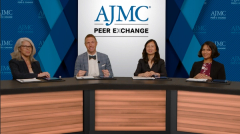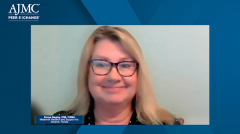
ESR1 Mutation Confirmation With Oral SERDs
Dr Lu discusses whether ESR1 mutation confirmation is required to consider therapy with oral selective estrogen receptor degraders.
Episodes in this series

Ryan Haumschild, PharmD, MS, MBA:When we think about genomic expression, we’ve talked about ESR1 [estrogen receptor 1] and I’ve talked about the importance of it. But really, the question at hand, Dr [Janice] Lu, is: Do you feel that the ESR1 mutation confirmation is going to be required to consider therapy with oral SERDs [selective estrogen receptor degraders]?
Janice Lu, MD: It is required. I want to go back to Dr [Neelima] Vidula showing us the whole road map of ER+[estrogen receptor positive]/HER2- breast cancer patients and how impressive the data [were], but the best is the amount of benefit the patient has with progression-free survival and overall survival at this point. But limited to patients with ESR mutation is acquired mutation. Quite often initially the patients don’t have this mutation. They work well with CDK [cyclin-dependent kinases] 4/6 inhibitors in combination with AI [aromatase inhibitor] or fulvestrant; however, they [can] develop a mutation up to 30% to 40%. And that ESR1 mutation is absolutely required. And as proved by MOH file, patients got 8.6 months of disease-free progression again after 12 months of treatment with CDK4/6 inhibitors. And then Guardant360 is a convenient study that will do the testing for ESR1 mutation. Yes, we constantly do this and now we check the patients, but not in the first-line; first-line is CDK. After patients fail the first-line we check for the ESR1 mutation. If the patient does not have an ESR1 mutation and you put the patient on a different line of therapy, I want to point out that when the patient fails, the second line or the third line, we should check again because you can acquire an ESR1 mutation again. So, we don’t want to lose the benefit of the FDA-approved oral SERD for the patient’s benefit.
Ryan Haumschild, PharmD, MS, MBA: Calling out the treatment pathways and making sure that we’re retesting is important. Sometimes in community settings and other settings, they’re busy and that may not be part of their treatment pathways. How do we make sure that we’re continuing to look for that with our patients, because as you said, those with expression had better responses. We want to make sure that we’re always reviewing the landscape because things can change throughout the course of therapy, and we want to make sure we’re providing our patients with the best chance.
Janice Lu, MD: Absolutely. We need a liquid biopsy because some patients feel we should use archive tissue, but at the time the archive tissue was taken there were no ESR1 mutations, so it would not add additional benefit or offer more information to us for their treatment options.
Ryan Haumschild, PharmD, MS, MBA: And having a liquid biopsy can be very favorable because sometimes you don’t have enough tissue. Can we get the tissue? We don’t want to create even further delays in care. So that’s a great comment.
Neelima Vidula, MD: I agree with what Dr [Janice] Lu said. I would add that there. There is a lot of potential value to serial cell-free DNA testing on progression from prior therapies. We presented some work at San Antonio this past year where we looked at what was the relative benefit of getting subsequent cell-free DNA draws. And we were able to demonstrate that you can identify other actionable mutations and because that could open up therapeutic opportunities for patients, I think it’s really important to consider for patients, especially if there are clinical trials available, too, that they could go on.
Ryan Haumschild, PharmD, MS, MBA: I’m hearing a lot of value in continuously testing our patients. Making sure that mutations haven’t changed. Are there extra mutations that we might have in an open clinical trial that we can enroll the patient and how important testing is to the overall treatment continuum.
Transcript edited for clarity.
Newsletter
Stay ahead of policy, cost, and value—subscribe to AJMC for expert insights at the intersection of clinical care and health economics.






